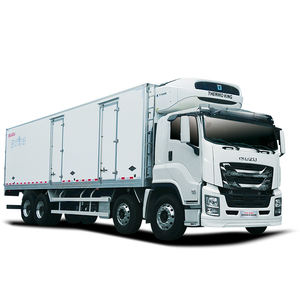Reefer Trucks Thermo King: Leading the Way in Cold Chain Technology
Reefer Trucks Thermo King: Leading the Way in Cold Chain Technology
Blog Article
Leading Technologies in Transport Refrigeration: Enhancing Performance and Safety And Security
The landscape of transportation refrigeration is undertaking considerable transformation, driven by advancements targeted at enhancing both performance and security. Key advancements such as wise temperature surveillance systems, eco-friendly cooling agents, and automated route optimization are critical in dealing with the industry's difficulties. These technologies not just guarantee the stability of temperature-sensitive products however also add to sustainability initiatives. As these advancements remain to evolve, it is important to explore their effects on operational techniques and regulatory conformity, triggering a better assessment of exactly how they improve the future of transport refrigeration.
Smart Temperature Keeping Track Of Equipments
In the realm of transport refrigeration, wise temperature level surveillance systems have become an essential development for making sure the honesty of temperature-sensitive items. These sophisticated systems utilize Internet of Things (IoT) innovation to offer real-time information on temperature fluctuations, enabling operators to maintain optimal conditions throughout the supply chain. By continuously tracking the temperature of chilled containers and vehicles, companies can quickly recognize variances that may compromise item high quality.

In addition, clever monitoring systems usually integrate automated signals and notifications, permitting stakeholders to react promptly to any type of potential problems. This aggressive method not just decreases the danger of putridity however additionally boosts compliance with regulative criteria controling food security and pharmaceutical transportation.
The integration of information analytics within these systems additionally helps with anticipating maintenance, aiding drivers to foresee prospective devices failures before they take place. This capacity reduces downtime and enhances operational efficiency, eventually causing set you back savings.
Eco-Friendly Refrigerants
Smart temperature level tracking systems play a vital function in maintaining product top quality, but the effectiveness of transport refrigeration likewise hinges on the option of cooling agents made use of. In contrast, emerging alternatives like hydrocarbon-based cooling agents and hydrofluoroolefins (HFOs) existing lower GWP options, providing both effectiveness and sustainability.
These green refrigerants not only lessen ecological influence yet additionally line up with worldwide policies targeted at eliminating hazardous substances. Their fostering can cause boosted power performance, inevitably lowering operating costs for transport refrigeration systems. Moreover, the use of all-natural cooling agents, such as ammonia and co2, has actually gotten grip because of their outstanding thermodynamic residential or commercial properties and lower environmental footprint.
Spending in eco-friendly cooling agents is not just a regulative compliance step; it represents a strategic choice that improves brand reputation and fosters customer commitment. refrigerated transportation thermo king. By focusing on sustainable practices, companies can add to a greener future while making sure the integrity of moved products
Advanced Insulation Products
Using advanced insulation products is crucial for maximizing transport refrigeration systems, as they considerably enhance power efficiency and keep constant temperature level control. Standard insulation techniques often fall brief in avoiding thermal transfer, leading to raised power consumption and changing temperature levels within cooled areas.
Emerging products such as vacuum protected panels (VIPs) and aerogels offer premium thermal resistance, enabling thinner accounts without endangering performance. VIPs, for example, make use of a vacuum layer to decrease convective and conductive warmth transfer, making them optimal for space-constrained applications. Aerogels, recognized for their light-weight and permeable framework, give outstanding insulation while significantly decreasing overall system weight.
Additionally, including phase change materials (PCMs) right into insulation systems can additionally maintain temperatures during transit. These materials take in and launch thermal energy, effectively buffering against outside temperature variants.
The assimilation of these sophisticated insulation materials not only reduces the operational costs related to power intake but also extends the life span of temperature-sensitive goods. As the transport refrigeration industry remains to develop, the adoption of cutting-edge insulation technologies will be pivotal in enhancing both efficiency and safety in chilled transportation.
Automated Course Optimization
The performance of transportation refrigeration systems is substantially boosted through automated route optimization, which leverages real-time information and sophisticated algorithms to identify the most efficient courses for shipment. By evaluating various aspects such as traffic patterns, climate problems, and distribution home windows, these systems can dramatically lower travel time and fuel consumption.
Automated path optimization minimizes human error and subjective decision-making, which can bring about inadequacies. This innovation allows fleet managers to designate resources better, making certain that cooled goods keep their needed temperature throughout the trip. By enhancing routes, firms can also boost client complete satisfaction via prompt deliveries.
Additionally, automated systems can adjust to unpredicted situations, such as roadway closures or unexpected website traffic spikes, permitting dynamic rerouting. This flexibility not only protects the stability of temperature-sensitive items but additionally adds to overall functional efficiency.
Carrying out automated course optimization can lead to significant expense savings while minimizing the carbon impact related to transport. As services significantly focus go to the website on sustainability, this innovation attracts attention as an important part in contemporary transport refrigeration, lining up functional objectives reference with environmental responsibility. Eventually, automated path optimization stands for a significant development in the mission for performance and safety in transport refrigeration.

Real-Time Information Analytics
Automated path optimization substantially take advantage of the integration of real-time information analytics, which supplies crucial understandings right into the performance of transportation refrigeration systems. By using real-time data, transportation drivers can check temperature fluctuations and tools performance, making certain that disposable products are preserved within called for parameters throughout transportation. This proactive technique not just improves the quality of the moved products but likewise reduces the threat of putridity and loss.

In addition to boosting effectiveness, real-time analytics enhances safety by ensuring compliance with regulative requirements the original source for temperature control. This not just secures public health yet also strengthens a business's credibility - refrigerated transportation thermo king. As the transport refrigeration industry progresses, the integration of real-time data analytics arises as a foundation for driving innovation, sustainability, and functional excellence
Final Thought
In conclusion, the innovations in transport refrigeration considerably improve both performance and safety and security within the market. Jointly, these innovations represent an important advancement in transportation refrigeration, ensuring conformity with governing criteria and advertising a greener future.
The landscape of transportation refrigeration is undertaking substantial change, driven by advancements intended at boosting both performance and safety and security.Smart temperature level surveillance systems play an essential duty in maintaining product quality, but the effectiveness of transportation refrigeration additionally pivots on the choice of refrigerants used. Their fostering can lead to improved energy effectiveness, eventually decreasing operating expenses for transport refrigeration systems. Ultimately, automated course optimization stands for a considerable improvement in the pursuit for performance and safety and security in transportation refrigeration.
In final thought, the developments in transportation refrigeration dramatically boost both performance and security within the market.
Report this page